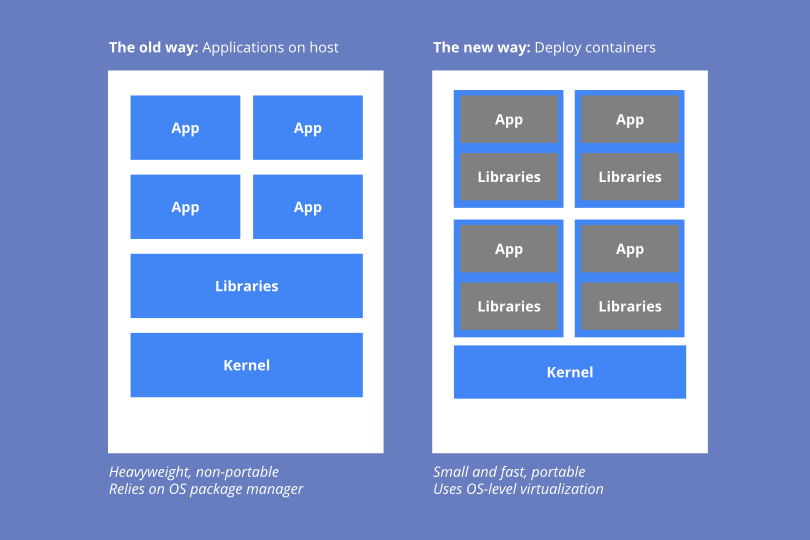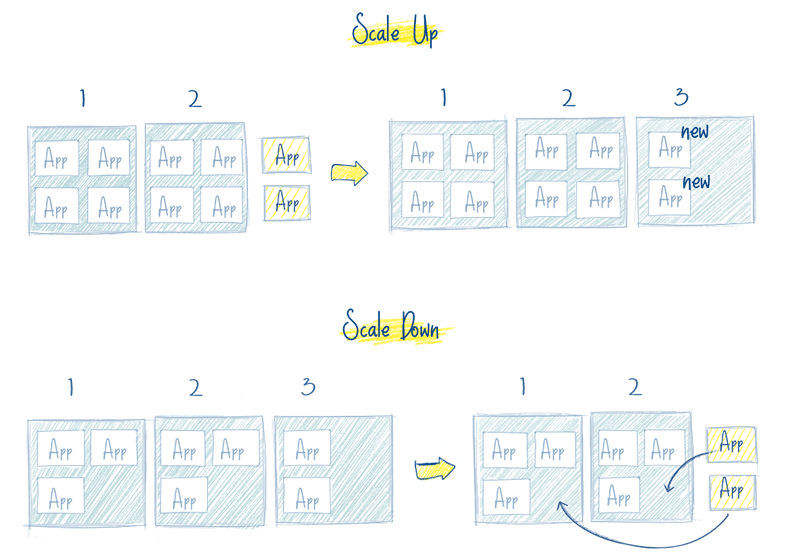
Трохи більше ніж 10 років тому був запущений проект контейнеризації Docker. Розробники з радістю переносили свої програми з віртуальних машин у контейнери Docker і відчували себе щасливими, незважаючи на проблеми, з якими стикалися. Однак через рік був створений Kubernetes, який став ключовою частиною контейнерної революції. Він ґрунтується на 15-річному досвіді Google і був розроблений експертною командою Google. Kubernetes не тільки спростив розробку додатків, але й надав більше гнучкості та можливостей для масштабування проектів.
Фактично контейнери революціонізували індустрію розробки програмних рішень. На сьогодні більше половини проектів, які команда Stfalcon розпочала у 2019 році, насправді є розробкою додатків з використанням Kubernetes. Сьогодні ми трохи поспілкувалися з Євгеном Гуриновичем — нашим лідером команди DevOps. Він допоміг нам зрозуміти суть платформи, кому потрібен Kubernetes, в яких проектах він працює найкраще і, зрештою, чому взагалі Kubernetes. Читати далі, щоб дізнатися більше.
Що таке Kubernetes, також відомий як Kube або K8s?
Це спеціальна система з відкритим кодом, яка допомагає в автоматизації адміністрування, розгортання, мережевої взаємодії, масштабування та доступності контейнерних додатків через оркестрацію контейнерів.
Простими словами — вона об'єднує контейнери, які складають додаток, в логічні одиниці, щоб спростити їх адміністрування та виявлення. Таким чином, додаток розробляється разом з операційним середовищем, яке йому потрібно, а платформа підтримує його в активному стані, оновлює і швидко реагує на запити користувачів. Додатки, які стають «нездоровими», можуть бути автоматично відновлені, і не потрібно вручну втручатися або залучати увагу розробника. Kubernetes виконує цю роботу сам і розподіляє навантаження, щоб забезпечити безперебійну роботу згідно з баченням оператора.
Чому Kubernetes є значним кроком вперед для спільноти DevOps?
Сьогодні розробникам потрібно створювати програмні рішення, які працюють у різних середовищах, включаючи публічні хмари, віртуалізовані приватні хмари та виділені локальні сервери.
З Kubernetes інфраструктура не є закритою, оскільки пропонує більше основних можливостей для контейнерів і не накладає обмежень. Поєднання функцій у платформі Kube, включаючи Pods і Services, зробило це можливим.
Сучасні додатки в певному сенсі залежать від конкретного операційного середовища, наприклад, проблем з продуктивністю, пов'язаних з архітектурою мережі, відданості хмарним конструкціям і залежностей від конкретної системи зберігання на бекенді.
Іншими словами, сучасні додатки залежать від різних змінних, які формують їх операційне середовище. Коли виникає проблема в середовищі, продуктивність додатка страждає або він виходить з ладу. Виявити та виправити всі ці помилки — це виклик, навіть якщо ви маєте справу з кількома змінними.
З великими проектами це іноді стає великою проблемою, але оркестрація Kubernetes тепер справляється з цим легко. Вона перевіряє життєздатність кожного компонента операційного середовища та вносить необхідні оновлення, коли це потрібно.

Причини, чому ви повинні використовувати контейнери
Більше того, модульний підхід сприяє швидшій розробці. Команди, які є меншими, але більш зосередженими, беруть на себе відповідальність за певні контейнери та працюють над ними. Це також дозволяє ізолювати залежності та більш широко використовувати добре налаштовані, дрібні компоненти. Крім того, це усуває спокусу забивати занадто багато функцій в один контейнер.
Таким чином, сервіси можуть бути сформовані для виявлення, спостереження та балансування навантаження без труднощів. Kubernetes спрощує масштабування будь-якого проекту, роблячи його легким і безтурботним.
Які переваги Kubernetes?
Перша і найголовніша перевага Kubernetes як зовнішнього сервісу полягає в тому, що він дружній до DevOps. Це безумовно прискорює процеси створення програмного забезпечення, тестування продуктивності та випуску продуктів. Таким чином, він має перевагу в економії часу для IT-спеціалістів. Тепер набагато легше управляти контролем версій та життєвим циклом додатків через всю інфраструктуру.
Крім того, Kube допоміг зосередити більше уваги на тому, як продукти розгортаються, масштабуються та оновлюються.
Наразі розгортання нової версії може бути організоване одночасно з попередньою версією. Масштабування нового розгортання також може бути реалізоване одночасно зі зменшенням масштабування попереднього розгортання.

Kubernetes підвищує масштабованість додатків, гарантуючи, що вони не зламаються в критичний момент.
Чому Kubernetes кращий за традиційний PaaS?
K8s не накладає обмежень на типи додатків, які підтримуються, таким чином надаючи широкі можливості для цього. Він не регулює фреймворки, підтримувані мови або не розрізняє «сервіси» та «додатки». Якщо рішення може працювати в контейнері, то, швидше за все, воно добре працюватиме на Kube.
Ще одна перевага K8s - максимально ефективне використання апаратного забезпечення. Тепер додатки, які використовують мінімум ресурсів, можуть бути згруповані на одному апараті. Ті, що потребують розширення, можуть бути розміщені на системах, де у них буде місце для розвитку. Крім того, можливо автоматизувати оновлення, які розгортаються по кластеру, або повернутися назад, якщо оновлення зламаються.
Kubernetes дозволяє підтримувати безліч кластерів синхронізованими в різних хмарах і регіонах. Таким чином, розгортання додатка може залишатися стабільним між кількома кластерами. Кластери, в свою чергу, можуть розподіляти виявлення сервісів таким чином, що можна отримати доступ до ресурсів бекенду з будь-якого кластера Kubernetes.
Які бізнес-переваги Kubernetes?
Ми б сказали, що все вищезазначене є ще більш важливим для ведення бізнесу, ніж для розробки програмного продукту.
Будь-яке програмне рішення, створене в наш час, повинно
- швидко виходити на ринок,
- демонструвати життєздатність і
- бути готовим до масштабування.
Ці фактори важливі для будь-якого бізнесу. Як власник бізнесу та клієнт, ви завжди хочете отримати свій продукт швидко, і Kube дозволяє заощадити час на розробку. Завдяки можливостям автоматичного відновлення та оновлень, ви також отримуєте продукт, який є життєздатним на ринку. Більше того, завдяки можливостям архітектури Kubernetes, масштабування продукту можливе в будь-який час.
Висновок
Середовище розробки Kubernetes наразі надзвичайно популярне завдяки своїй новизні, архітектурі та величезній спільноті з відкритим кодом, яку воно має. Ми вже освоїли всі тонкощі роботи з цією технологією і готові впроваджувати її в наші нові проекти. Наш наступний проект може стати вашою актуальною ідеєю, просто напишіть нам, щоб обговорити це.



